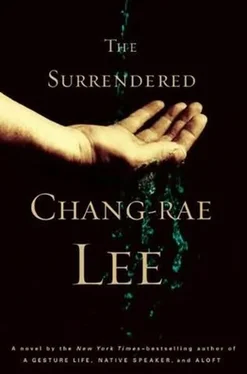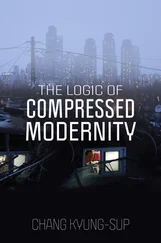He had been around enough places like Smitty’s to know that a woman of Dora’s age and station had perhaps one remaining chance at a generally undamaging union. No one at Smitty’s was any use, but maybe someone would walk in one night by accident and save her, a traveling salesman, a retired cop or firefighter. Even (and, maybe, best) another woman. Or perhaps Dora had no chance, being already lost, a scenario in which he would thus serve as none other than the precipitating element in her life’s final downdraft.
He made his way east on Whiteman Street and then walked the half-block south on Lemoine Avenue to where he worked, a small two-story Korean mini-mall wedged between Lemoine and Palisade avenues. Hector was the night and weekend custodian of the property, and more often than not he did the work of the day custodian as well, given that the day custodian-his boss, Jung-only periodically showed up.
This morning he found Jung as he sometimes did on Sundays, the thin, deeply tanned man curled up in the ratty vinyl love seat in the ground-floor custodian’s office, snoring loudly with a mesh golf cap pulled down over his eyes. Hector could smell the familiar stale reek of Jung’s busy night, the sugary charcoal of Korean barbecue and the funky gas of his sleep breath sharply perfumed by garlic and Marlboros and Chivas Regal. An empty bottle of the whiskey lay on its side on the floor. Today was unusual only because Jung was still wearing golf clothes, wearing even his black-and-white saddle golf shoes, tufts of grass and dried mud stuck in constellations about the spikes.
As Hector changed into coveralls, Jung grunted, eyeing him, rooting around in his trousers to scratch and rearrange. He let out a sharp fart before turning over and going back to sleep. He was already snoring when Hector opened the janitor’s closet where he kept the tools of his trade. The man was a lower god of indolence. Hector noisily hefted the heavy commercial vacuum (Jung didn’t stir) and rode up the elevator to the second floor. It was just after nine in the morning and the place was empty of activity save in the Korean restaurant on the mezzanine, which was open twenty-four hours; a lone diner spooned methodically at a half-dozen small plates of vegetables and a stoneware casserole of steaming soup. A waitress sat two tables away, robotically folding utensils within cloth napkins. When she looked up and saw him, her body relaxed and she smiled, waving him in. Hector suddenly realized he hadn’t eaten-not since yesterday’s lunch-but he wasn’t hungry yet and made a gesture to her to say that he would work first.
He set himself to vacuuming, pushing the machine back and forth on the mezzanine where the carpeting wasn’t frayed and could get caught up. In most spots it was worn down to the webbing; one could see the poured-concrete floor beneath it. The mall itself was similarly decrepit, the linoleum overlay by the entrance scratched and buckling, and the central elevator rickety-sounding and dangerously temperamental, its doors sometimes opening just before reaching the right level. The entire inside was painted in cheap off-white paint, save for the ceiling above the central open well, which was a slightly different shade of the old color, somewhat duller, where the painters couldn’t (or hadn’t bothered trying to) reach. The owner didn’t care if the place was in presentable, or even half-presentable, shape, as the tenants clearly valued most the modest rents. Nor did the poor condition of the building seem to dissuade the steady foot traffic of the Koreans and Chinese and the few non-Asians who shopped there and ate at the restaurants. Despite the state of the mall, most of the goods in the shops weren’t inexpensive, certainly nothing Hector could ever afford-knockoff designer clothing and shoes and home and car audio equipment with brand names he didn’t recognize. There was also a hair salon, an Asian video store, a toy shop, a bakery, a copy shop, a dentist who was also an acupuncturist, and a tae kwon do studio, as well as the karaoke bar and the restaurant.
In the time that Hector had worked in the mall, there had been what seemed to him an extremely high turnover of tenants, none except the restaurant remaining open for very long, and then even the restaurant changed ownership twice in the last few years. Jung had told him that it was because the tenants were often inexperienced business-people, immigrants who got onto a notion of selling some product they could import cheaply and easily, but rarely, it would turn out, cheaply and easily enough to compete with the stores at the large malls nearby. The dentist did reasonably well, as did the bakery, which sold sweet, buttery breads and pastries filled with custards and sweet bean paste the customers couldn’t get anywhere else. But mostly the stores here were poorly planned, overhopeful, hastily opened ventures that were preordained to fail, or, even worse, to fail ever so slowly, in an unremitting, soul-grinding diminishment that was invisible by the hour and the day but by season’s end could be seen in the wilted posture of a store owner as she hand-lettered signs for a clearance table of handbags and scarves. Except for Sang-Mee, the waitress at the restaurant, Hector kept his distance from the tenants so as not to have to deal with their potential difficulties and failures, which might stir up in him an even more insidious disturbance than his suddenly charged empathy, something that he could not so easily drink into oblivion or brawl his way through.
Before the incident with the boy soldier he had been a willing enough soldier in their war. Or maybe not their war exactly, but Mao’s war, or Truman’s, or someone else’s; it was a war that from the beginning had been nobody’s cross, inciting only mild attacks of patriotism and protest, jingoism and pacifism, a war both too cold and too hot and that managed to erase fifty thousand of his kind and over a million of theirs. Hector had enlisted immediately after hostilities broke out and so was among the first to be shipped to Japan before landing in Inchon, among MacArthur’s forces. He was twenty years old and of course carnally educated but knew little of much else. He had a healthy native intelligence but it was never more than lightly worked, due to his patent beauty and his prowess on the playing fields and in schoolyard fisticuffs. If the North Koreans hadn’t invaded their brethren in the South, he would simply have worked at Remington, if not in arms, then in typewriters, adding machines, whatever else. He would have been a husband and a father and played baseball on summer Saturdays with his buddies and inevitably slept with some of their wives, but at least it wouldn’t have been at his invitation, never his initial doing. In his alternate life there would have been the customary troubles, his own wife maybe leaving him and coming back and leaving him again in a serial drama that had as its greatest satisfaction the comfort of familiarity, of reprise, his days played out in a circle no larger than the carry of a human shout. He sometimes wondered what his life would be like for him now, as a middle-aged son of Ilion; by now he’d be drawing a small pension and playing with his grandchildren on the porch of a row house on a street thick with other Brennans and wondering what it would have been like to have ventured out and seen the wider world.
With the war he saw it fully wide and dark and deep. But it wasn’t the usual rough awakening: he’d never been in thrall to the notion of hero. As a soldier he’d pictured himself not a savior, or some killing machine, but rather one of countless figures on the battlefield, just like the toy soldiers he played with all through his youth; each mini-statuette was formed in one of several poses, as either a prone shooter or a bayonet-wielding assaulter or a marcher, Hector seeing himself as the last of these, the ones the other boys didn’t care for and would trade to him at ten to one for the others. He was captivated by the swarm of great numbers, the feel of them bunched in his hands like a massing of tiny bones. On the chipped, painted porch of his parents’ house he’d line them up in neat rows, the marchers, gritty-faced, pushing on, their rifles shouldered, and though many in the front would perish before the shooters and bayonets, he knew their flood would prevail.
Читать дальше











